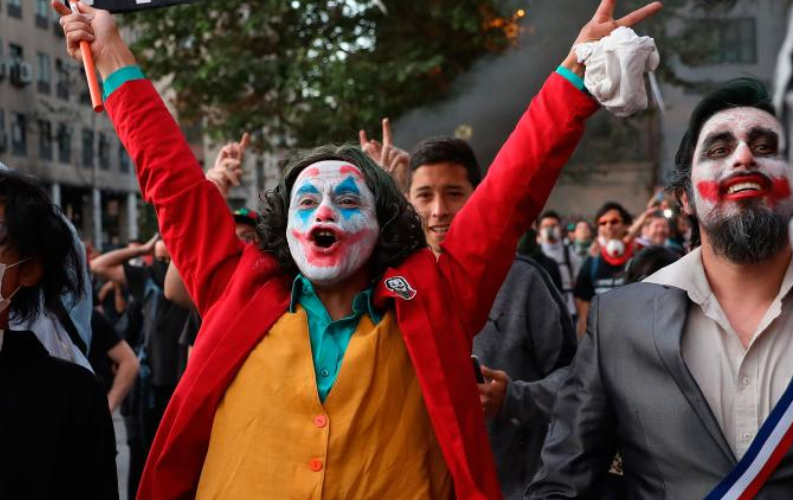One of the projects I’m involved in at the moment is an investigation into Science Communication, and this project has the nice by-effect that from time to time I can turn theory into practice. The project researches in which ways academians, scholars and other people in the sciences and humanities interact with non-academic crowds; and once in a while I am myself in the position to interact with interested or concerned publics.
And whenever I answer such public calls, I realise how difficult it is to be satisfied with the end result. To wit:
At the end of October I received an e-mail from a producer at CNN who was interested in the usage of a particular mask during recent protests. She told me that she had seen people in Joker-make up or -masks in protests in Lebanon, Hong Kong and Chile, and was flabbergated as to why protesters would choose a villain (of recently renewed movie fame) as a masquerade. Whilst I haven’t written anything about the Joker or recent protests, she told me she had read my article from 2019 about the Guy Fawkes-mask and therefore considered me an expert.
Important mental note: For the mass media, the line between expert and lay person is a thin one. That was one of the things I had read repeatedly in the descriptions of science — media interactions, but it was surreal that a producer from the US East Cost would want to phone a German guy about such a phenomenon, presuming him to be an expert because of one article she had read by him. Anyway, after updating myself about the appearance of joker-faces in current protests (few at the time), I convinced myself that I could indeed say something substantial about the topic and gave her my number.
We scheduled a telephone interview, I spend nearly two hours prior preparing what I hoped were stringent, short answers to her possible questions, and then we talked for roughly 20 minutes. Well, I talked, mostly, answering the producer/reporter’s questions about the role of masks in protests (veiling your face, bringing a carnevalesque mood to the scene, connecting either with other protesters or with international audiences via pop-cultural references etc.) and guiding her towards the ambiguity the Joker character has built up and that that was a great base for internet memes and thus worldwide attention. Pop culture sells, I told her, even as an item of protest.
Second important mental note: My quite long preparation came in handy, as her questions almost always met with what I had thought she’d be interested in. My bullet points helped my against the ur-scholarly appetite for longish explanations, meandering sentences produced by too detailed a knowledge and general school-masterly-ness (Does that word exist? It should!).
I also tried to incorporate a bit of wisdom I gathered from several texts on scholar-reporter-communication: After a more or less academic portion of your answer, it advised, try to repeat the gist of it in a colloquial manner. In my own words: Talk like a teacher, then summarise like a smartass.
Seemed like sound advise, thus I did just that: All the ground I covered was signposted with some more or less intriguing quotidian phrases, supposed to round it all up nicely. Alas! when the article that contained the interview was published a week later, I noticed two things:
- Quite a lot of what I had explained about the general background of current protest movements and media environments as well as possible reasons for people to don the mask/make up, went into the article unattributed. Hurts the inflated sense of myself, but okay: I guess that’s how things are. A person should never witness how sausages or news articles are produced, Bismarck once (more or less) said.
- More worringly is the fact that the only direct quotations that went into the article alongside my name were exactly those quotidian round-ups I had provided for salience’s sake. In the context of the article, which is constructed around e-mail interviews with protesters, unattributed background info and my down-to-earth, no-nonsense “lemme tellya straight”-quotations, my own words sound like the least-reflected in comparison with the protesters and the article writer.
Both of these observations are not to say that the producer-writer has done anything wrong or hasn’t acted in good faith. The effect, though, leaves me in an unfavourable light, at least regarding the standards I set for myself. Those don’t mean that I have to come out the smartest person in the room whenever I open my mouth (reality proves me wrong there on a daily basis), but somehow I feel misrepresented simply by the decision of the reporter which words to choose and which ones not. And, a bit, which ones to mention but not attribute.
I wonder in which way I can conduct or guide possible future interviews to turn out a bit more in my favour. And I now begin to understand at a personal level how different the logics between mass media compatibility and academic discussions are. And, finally, I will re-think heeding those advices from obsure manuals…
PS: The photo above is taken from the CNN-article. It’s attributed to “AP Photo/Rodrigo Abd.” And doesn’t this guy from Chile look a bit like that Guy Fawkes-themed Occupier from Berlin I used to illustrate a past conference?

